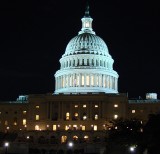
Safeguarding Public Health and the Environment

Top 400 Taxpayers See Tax Rates Rise, But There’s More to the Story
As Americans were gathering party supplies to greet the New Year, the Internal Revenue Service released their annual report of cumulative tax data reported on the 400 tax r...
read in full
Chlorine Bleach Plants Needlessly Endanger 63 Million Americans
Chlorine bleach plants across the U.S. put millions of Americans in danger of a chlorine gas release, a substance so toxic it has been used as a chemical weapon. Greenpeace’s new repo...
read in full
U.S. Industrial Facilities Reported Fewer Toxic Releases in 2014
The Toxics Release Inventory (TRI) data for 2014 is now available. The good news: total toxic releases by reporting facilities decreased by nearly six percent from 2013 levels. Howe...
read in full
Methane Causes Climate Change. Here's How the President Plans to Cut Emissions by 40-45 Percent.
UPDATE (Jan. 22, 2016): Today, the Bureau of Land Management (BLM) released its proposed rule to reduce methane emissions...
read in full
Living in the Shadow of Danger: Poverty, Race, and Unequal Chemical Facility Hazards
People of color and people living in poverty, especially poor children of color, are significantly more likely...
read in full
A Tale of Two Retirements: One for CEOs and One for the Rest of Us
The 100 largest CEO retirement funds are worth a combined $4.9 billion, equal to the entire retirement account savings of 41 percent of American fam...
read in full
Gasping for Support: Implementation of Tougher Air Quality Standards Will Require New Funds for State Agencies
New scientific research shows that the current levels of...
read in full






 The Small Business Administration (SBA) is supposed to protect the interests of small businesses – businesses most Americans define as employing fewer than 100 workers. But a little-known office in the SBA, the Office of Advocacy, has recently weighed in with the National Toxicology Program (NTP), urging that it scrap a congressionally mandated Report on Carcinogens and challenging NTP’s designation of formaldehyde as a known human carcinogen. The NTP report is not a regulatory document. It does not directly affect small business costs. So what is the Office of Advocacy at the SBA doing objecting to a scientific report on carcinogens?
The Small Business Administration (SBA) is supposed to protect the interests of small businesses – businesses most Americans define as employing fewer than 100 workers. But a little-known office in the SBA, the Office of Advocacy, has recently weighed in with the National Toxicology Program (NTP), urging that it scrap a congressionally mandated Report on Carcinogens and challenging NTP’s designation of formaldehyde as a known human carcinogen. The NTP report is not a regulatory document. It does not directly affect small business costs. So what is the Office of Advocacy at the SBA doing objecting to a scientific report on carcinogens? Next week, members of Congress from both chambers will meet to negotiate a comprehensive federal transportation bill. They will have to hash out the differences between two disparate extension bills and address controversial, anti-environment policy riders in the House version. The House bill would force the approval of the full Keystone XL pipeline and includes an industry-backed amendment that would prevent the federal government from issuing uniform safeguards for potentially toxic coal ash waste. Environmental groups call the coal ash amendment a gift to Big Coal and are urging Senate conferees and the Obama administration to ensure that it is not included in the final transportation bill.
Next week, members of Congress from both chambers will meet to negotiate a comprehensive federal transportation bill. They will have to hash out the differences between two disparate extension bills and address controversial, anti-environment policy riders in the House version. The House bill would force the approval of the full Keystone XL pipeline and includes an industry-backed amendment that would prevent the federal government from issuing uniform safeguards for potentially toxic coal ash waste. Environmental groups call the coal ash amendment a gift to Big Coal and are urging Senate conferees and the Obama administration to ensure that it is not included in the final transportation bill.





